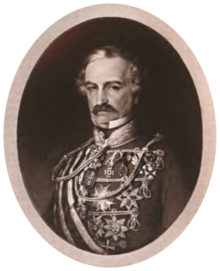Charles von Hügel
| Charles von Hügel | |
|---|---|

Charles von Hügel from a painting by Joseph Neugebauer. Florence, 1851.
|
|
| Born |
Carl Alexander Anselm Baron von Hügel 25 April 1795 Regensburg, Bavaria |
| Died | 2 June 1870 (aged 75) Brussels, Belgium |
| Nationality | Austrian |
| Occupation | noble, army officer, diplomat, botanist, and explorer |
| Known for | travels in northern India during the 1830s |
| Spouse(s) | Elizabeth Farquharson |
| Children |
|
Charles von Hügel (born Carl Alexander Anselm Baron von Hügel; 25 April 1795 – 2 June 1870) was an Austrian noble, army officer, diplomat, botanist, and explorer, now primarily remembered for his travels in northern India during the 1830s. During his lifetime he was celebrated by the European ruling classes for his botanical garden and his introduction of plants and flowers from New Holland (Australia) to Europe's public gardens.
Von Hügel was born in Regensburg, Bavaria, on 25 April 1795. In 1813, after studying law at Heidelberg University, he became an officer in the Austrian Hussars and fought in the armies of the sixth and seventh coalitions against Napoleon. After Napoleon's defeat, he visited Scandinavia and Russia, before being stationed with other Austrian troops in southern France and then Italy.
In 1824, von Hügel took up residence in Hietzing, a district of Vienna, where he established his botanical garden and set up a company to sell its flowers. He also became betrothed to a Hungarian countess, Melanie Zichy-Ferraris, but in 1831 she broke off their engagement to marry the Austrian chancellor, Klemens Wenzel, Prince von Metternich.
In the wake of his misfortune in love, von Hügel undertook the grand tour of Asia that would establish his renown. From 1831 to 1836, he travelled to the Near East, the Indian subcontinent, the Far East and Australasia, before returning to Europe via the Cape of Good Hope and Saint Helena. He seems to have been most intrigued by the Kashmir and Punjab regions of northern India, as he chose his experiences there to form the basis of the four-volume work published in the years following his return to Europe: Kaschmir und das Reich der Siek (Cashmere and the Realm of the Sikh). The first and third volumes relate von Hügel's journey across northern India, including meetings with Maharaja Ranjit Singh, the Sikh ruler of the Punjab, in Lahore and a number of other European adventurers; the second volume provides an account of Kashmir's history, geography and resources; and the fourth volume is a gazetteer.
...
Wikipedia
